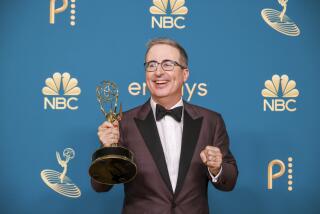Jesse Jackson Competes With Queen on TV : Britain: As she hails N. Ireland progress on BBC, American assails Tories on another channel.
- Share via
LONDON — While Queen Elizabeth II sent Christmas greetings paying tribute to those seeking peace in Northern Ireland, Jesse Jackson created a controversy here Sunday with his alternative holiday message in which he compared the Conservative government and party with racism and fascism.
The speeches by the queen and by Jackson, a civil rights leader and onetime American presidential candidate, aired at the same time, on separate television channels.
In remarks on independent Channel 4, which specializes in minority programs and views, Jackson said that living conditions for the poor in Britain were deteriorating under the Tories. He said the poor also suffered in America under conservative leadership.
“We must no longer allow the clock to be turned back on human rights or put up with political systems which are content to maintain the status quo,” he said. “In South Africa, the status quo was called racism. We rebelled against it. In Germany, it was called fascism. Now in Britain and the U.S., it is called conservatism.”
Peter Bottomley, a Conservative member of Parliament, assailed Jackson’s comments and accused the network of “stereotypical ignorance in allowing or telling their distinguished contributor to say something untrue to a national or international audience.” He said Channel 4 could have asked a black British leader to speak, instead, if it was seriously interested in providing a minority view about conditions in Britain this Christmas.
Home Secretary Michael Howard, and Ivan Lawrence, chairman of the Parliamentary Home Affairs Committee, said Britain has nothing to learn from Jackson on race relations issues.
Meantime, the queen, in her annual address on the BBC, said peace is “gradually taking root” in Northern Ireland. She added that there is “real hope of a permanent end to the bitterness of recent years.”
She said she would pray for global tranquillity, and apparently referring to the conflict between Moscow and the rebellious republic of Chechnya, she said she also hopes for peace, “not the least in Russia itself.”
“The sight of happy faces of children and young people in Russia, in South Africa, where so much has changed with such extraordinary speed in the last year, and in Northern Ireland, where there is real hope of a permanent end to the bitterness of recent years, should be enough to convince even the most hard-hearted that peace is worth striving for,” the queen said.
More to Read
Sign up for Essential California
The most important California stories and recommendations in your inbox every morning.
You may occasionally receive promotional content from the Los Angeles Times.













